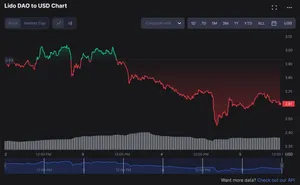Silvergate's collapse may worsen crypto's already tenuous relationship with US banks. Silvergate was one of the few "crypto-friendly" banks, and the clients it previously served — among them, Crypto.com, Bitstamp, and Paxos — may face challenges finding a reliable replacement.
Silvergate bank collapses
- "Silvergate has collapsed", The Verge
- "Crypto Bank Silvergate Capital Says It Will Shut Down; Stock Plummets", The Wall Street Journal
Lido token price tanks after podcaster spreads inaccurate rumor of Wells notice
Hoffman later retracted the statement in a long tweet and apologized, and the LDO price recovered somewhat, though not to its initial level. However, he continued to claim that "there is at least one confirmed Wells Notice that has gone out recently, that isn't known to the public", but wrote that "the idea of a mass recent carpet bomb isn't correct".
WSJ alleges Tether, Bitfinex, and related companies used falsified documents to obtain banking
Among other allegations, the WSJ outlined how Tether was repeatedly denied accounts at New York's Signature Bank, and so ultimately got an executive at an aviation fuel broker called AML Global to open an account that appeared to be used to fraudulently process transactions on behalf of Tether and Bitfinex.
Tether is the largest stablecoin in circulation, though its entire existence has been marred by questions around its legitimacy and the status of its claimed reserves.
Silvergate crypto-focused bank faces crisis
On March 1, Silvergate revealed that they would miss the deadline to file their annual report with the SEC, which they blamed on regulatory inquiries. They also revealed even more losses, which added to the massive $887 million in losses they experienced in Q4 2022. They also disclosed that they were having to evaluate whether the bank was going to be able to survive.
Silvergate's stock plunged on the news, worsening its already marked decline in price over 2022–23. Some crypto firms began distancing themselves from the bank, as well: Coinbase announced on March 2 that they would no longer be transacting with Silvergate "in light of recent developments and out of an abundance of caution". Galaxy Digital, Paxos, CBOE, Gemini, Crypto.com, and Bitstamp also announced they would cease transfers to and from Silvergate, and Circle announced they would be "unwinding certain services with them".
Developers accuse Binance of stealing their hackathon idea after Binance launches similar AI NFT product
Shortly after its launch, a group of developers accused Binance of stealing an idea they had presented at a December 2022 BNB Chain hackathon. Those developers had been awarded first place and $5,000 for "Chatcasso", a nearly identical tool.
Binance has refuted the allegations of theft, with a spokesperson acknowledging the "similarities" but claiming that "Bicasso was designed and developed independently more than two weeks before the BNB hackathon".
"It's disheartening to see a company that claims to support innovation and development steal from the very people who are working hard to build the ecosystem. Who would feel safe entering a hackathon? I don't." wrote one of the developers from the team. The developer also stated that they had not signed any contracts that would have assigned the rights to their work to the company, as is the case in some hackathons.
BitBNS discloses that they were hacked in February 2022, hid it as "system maintenance"
After zachxbt's investigation, BitBNS admitted that they had hidden the hack from customers. "Law enforcement advised us that the users should be educated about the incident only after the investigation is completed or reaches a dead end," said BitBNS CEO Guarav Dahake, who also said that some funds were ultimately recovered thanks to law enforcement and cooperation from other exchanges.
FTX co-founder Nishad Singh pleads guilty, agrees to co-operate against SBF
In direct messages to a Vox journalist in November 2022, shortly after the FTX bankruptcy, Bankman-Fried wrote that Singh had left, and that he was feeling "ashamed and guilty" because customer deposits were missing.
According to bankruptcy filings, Singh had received a $543 million loan from Alameda Research. Some of this may have gone towards illegal political donations, which Singh admitted in court to making, saying they were intended to bolster Bankman-Fried's and FTX's influence among politicians.
- "FTX Co-Founder Nishad Singh Pleads Guilty to Fraud Charges", The Wall Street Journal
- "FTX's Singh pleads guilty to six U.S. fraud, conspiracy charges", Reuters
Two BNB-based projects attacked for around $700,000 each
Later, 80% of funds in the liquidity pool for the defi project LaunchZone were suddenly drained, tanking the LZ token price over 80% to $0.026 from its previous price of around $0.15. The stolen funds were priced at around $700,000.
Some questioned if LaunchZone had rug-pulled. However, the project claimed that "$LZ is being hacked from [Dungeonswap] exploiter" and urged its users to "please keep calm". They also announced that they had paused trading and transfers of the LZ token.
Large Algorand holders have wallets drained
John Woods, the CTO of the Algorand Foundation, acknowledged the spate of hacks, writing, "I agree that there's too many of these hacks to be a coincidence". However, he stated that he was confident it was not an issue with Algorand itself. The Algorand wallet provider MyAlgo subsequently urged users to withdraw funds from wallets that use mnemonic phrases for recovery, suggesting that there may have been an issue with their software.
hideyoapes suffers $200,000 wallet drain
 Bored Ape #5917 was the most expensive NFT stolen, selling for 68.6868 wETH (~$112,750) (attribution)
Bored Ape #5917 was the most expensive NFT stolen, selling for 68.6868 wETH (~$112,750) (attribution)The thief sold all the NFTs and then transferred the proceeds from the sales to their own wallet. Altogether they made off with 127.3 wETH (~$208,000).
On Twitter, hideyoapes explained that they had downloaded and installed the MetaMask wallet extension from MetaMask's official website. "I didn’t think anything of it because it was the legit site and verified chrome app. While I was sleeping all my assets were sold," they wrote. At this point, it's not clear how exactly the hack was perpetrated.




![Tweet by BNB Chain: "The grand prize winners of our third track, Lifestyle in #Web3, is the wonderful team Chatcasso 🥇
Chatcasso is a guided platform that allows users to easily and conveniently mint NFTs using only text input through the use of AI technology.
[9/11]"](https://primary-cdn.web3isgoinggreat.com/entryImages/resized/bnb-chain-hackathon-tweet_300.webp)



